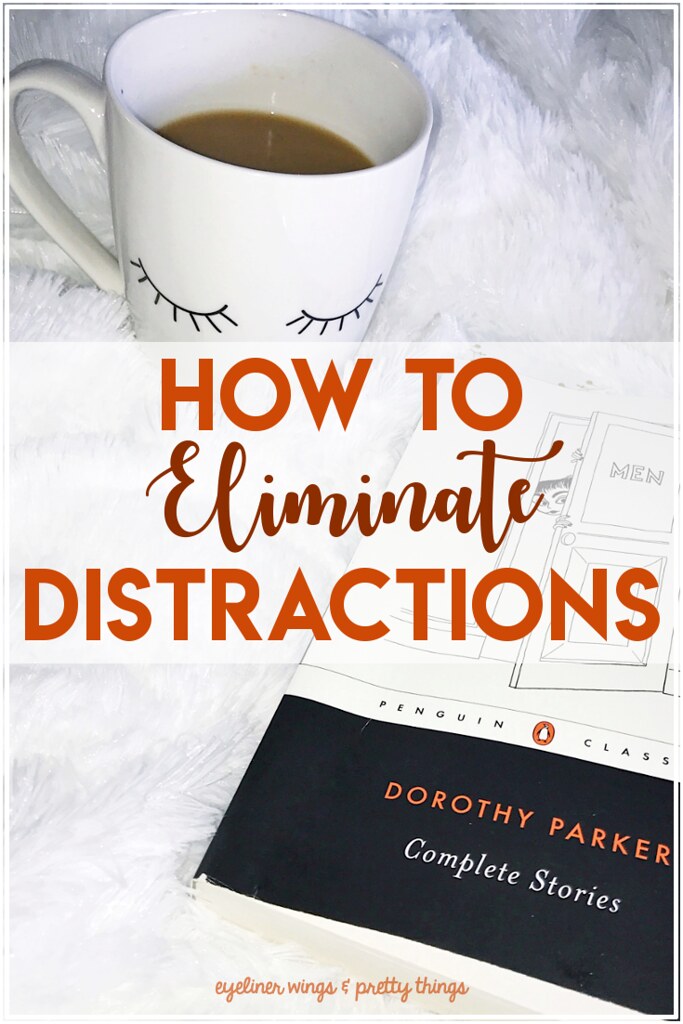While writing this blog post alone, I checked my phone, fixed the time on my clock, peeled off nail polish, wrote a job application and made my bed. When left to my own devices during a long winter break in which all of the “to-do” tasks are not mandatory, but rather tasks I have brought upon myself, I find it very difficult to conquer distractions. But, I’ve certainly gotten a lot better as of late. The ability to eliminate distractions is both inherent and learned, and there are a lot of things to be done in order to eliminate distractions without turning everything into a procrastination session. Let me explain…
1. Learn What Distracts You
Sometimes this is glaringly easy and other times it can be quite difficult. Distractions can also change depending on where you are or what you’re trying to accomplish. For example, when trying to write a paper on my laptop, I am often distracted by YouTube and reading other websites. When trying to check e-mails on my phone, I am distracted by my other apps (including Animal Crossing Pocket Camp, have any of you guys begun playing that yet? I’m obsessed!). When I am working in my kitchen, I find myself distracted by all of the snacks and food surrounding me.
All in all, each space and task has different distractions. Rarely will there be universal distractions, unless you count a cell phone as one distraction.
If you’re struggling to see what your distractions are, give yourself a list of tasks. As you complete these tasks, keep note of things that keep pulling you away from the task. Maybe you’ve begun to notice that as you’re working on your paper, the overflowing laundry basket keeps distracting you. These distractions can range from factors you can control to factors you can’t, so take note of that as well.
2. Try Different Solutions.
Not every distraction will have the same clear-cut solution. This part may involve a lot of trial and error. Here are some sample solutions for you to apply where you see fit.
1. Create Time Restrictions
By forcing yourself to complete your task within a certain time limit, you may force yourself to eliminate distractions. For example, if you give yourself twenty minutes to organizing your bookshelf, it might stop you from skimming through all of your old books rather than simply organizing the books.
2. Move to a New Location
For me, moving to the library often eliminates distractions. Perhaps moving to a more isolated location can eliminate social distractions. Sometimes even moving to a different location in the same room (like from bed to desk) can make all of the difference.
3. Block or Remove the Distraction
This is easiest when websites and apps are your main distraction. You can download extensions that block websites from you if you lack self-control or you can delete the app. I find myself moving distracting apps to the last page of my phone, so by the time I swipe to it I am more aware that I am distracting myself.
In some extreme cases, it may help to delete your account or have someone you know change your password to break the bad habit of procrastinating on certain sites.
4. Fix the Distraction
This mostly applies to minor, quick-fix distractions. For example, chipped nail polish can distract me if I am working on planning blog photos. A quick fix would be painting my nails. Or, a cluttered desktop might distract you from writing a paper. A quick fix would be decluttering the surface.
It is important not to turn fixing a distraction into a procrastination effort. Namely, if you decide to fix your chipped nail, do not turn it into giving yourself an entire manicure and pedicure, essential oils and all. Remember your original task and consider the “fixing of the distraction” to be part of the task, not a separate side task.
[ Also see: 10 Ways to Stop Procrastinating ]
5. Generate Accountability
Give yourself some sort of deadline and tell a friend or family member. You can even join an accountability group if it’s something like writing a book or training for a marathon. When you’re being held accountable by others, sometimes distractions can become a lot less distracting.
6. Create Self-Awareness
For some, this can work. There are apps and web extensions that can track how much time you spend on each website. This can certainly be eye-opening when you realize how you’ve been spending your time. Personally, this does not stop me from partaking in distractions, but for those who often benefit from “wake up call” style situations, this can be beneficial.
7. Make a Slight Adjustment
These generally won’t take a lot of time (so they won’t turn into procrastination) and they can make a huge difference.
– Outfit Adjustment
Depending on the task and your mindset, this either involves putting on something more comfortable or less comfortable. For example, if you’re in your pajamas while trying to write a research paper, you may be able to get more work done if you are wearing jeans and a nice shirt. On the other hand, if you’re wearing jeans while trying to work and find yourself not getting work done, throwing on sweatpants might help. Personally, changing out of pajama pants into leggings somehow boosts my productivity by a lot.
– Lighting Adjustment
Perhaps turning on your desk lamp or moving to a room with more sunlight can boost your productivity and eliminate distractions.
– Temperature Adjustment
Simply being too hot or too cold can be a distraction in and of itself. Before beginning your task, eliminate this distraction by turning on a fan or putting on a pair of fuzzy socks.
3. Take Breaks
Sometimes taking a break can be the best way to restart and get back on task. To, again, avoid turning these breaks into sources of procrastination, set an alarm on your phone. Limit your break to one episode of a show or twenty minutes of relaxing and eating a snack.
4. Break Down the Task
Take your to-do list and make it even simpler. For example, turn “Clean Bathroom” into a bunch of smaller tasks, like clean the tub, organize the vanity, re-fold towels and clean mirror. A huge distraction can often be not knowing where to start. Eliminate it by turning large tasks into smaller ones. Even creating an arbitrary order can help eliminate the “Where do I even begin?” distraction.
What are some of your worst distractions?








I love the different solutions you came up with! This is such a great post!
http://bysophialee.com/
Thank you, Sophia! I’m glad you enjoyed it.
Yes! These are great tips! It’s so hard sometimes!
Thanks Ellen! I totally agree